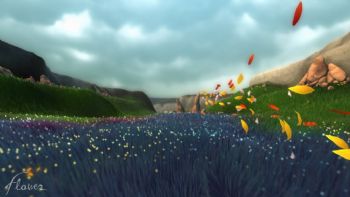Where Are the Mrtial Art Stuff in Buy Mode Sims 3?

Games are not art — they're better. It just depends on whom you ask.
There's this on-again, off-over again argument within the intelligentsia as to whether games should exist placed on the same pedestal as books, movies, music, and paintings. Just even the newest of the accepted fine arts, movies, have had at least a century to develop.
Conventional videogames–and I'k taking Pong, the equivalent of cave drawings, every bit my starting indicate here–commenced less than 40 years ago. In that time, games accept mimicked movies, electronically emulated books, and tried their manus at playing on some emotional heartstrings. The large difference is that most conventional fine art forms are passive and two-dimensional experiences: You sit in front of and soak in whatever the creative person presents you with. Videogames attempt to create an interactive experience that puts the viewer/ player in command of the palette.

Enter Shanghai-born Xinghan "Jenova" Chen, artistic director of ThatGameCompany. Since earning his graduate degree from the University of Southern California Film School'due south Interactive Media plan, he has helped craft several elementary-but-surreal game projects that do more than than cater to a twitch response. His thesis projection, Deject, floated along, accumulating a following on the indie gaming scene. Flow bandage players as an ever-evolving single-celled organism–and that, no doubt, inspired the first stage in Spore. The best fashion to describe Chen'south latest game, Flower: It's a first-person gardener. And it's well-worth the $10 request price at Sony's PlayStation Store.
The levels, if yous choose to call them that, are the dreams of flowers. You lot are the current of air, fulfilling bloom fantasies–yep, it sounds kind of strange. But just endeavor it. This is a Zen exercise with an occasional trophy for completing a task. A meditation pool with an endpoint. More important, it passes my all-important "wife test": She was entranced as she watched me play, until finally she yanked the controller out of my paw to try her luck with information technology. The concluding time I got that kind of response out of her was when BioShock came out.
Only back to the old "games-versus-art" argument (I'thousand looking at you, Ebert). I spent some time chatting with Chen recently well-nigh the state of gaming and how (if at all) information technology's maturing. Here's what nosotros came upward with:
A Boy and His Flower
PC World: How would you try describing Flower to someone? Is information technology a game, art, or something else entirely?
Jenova Chen: Flower is made with a different mentality. It's a safe, warm feel. It'southward like a poem or dance that uses symbolism and scenery to give the actor a comforting backdrop.
PCW: And I gauge that this would brand y'all the choreographer?
JC: [laughs] Yeah, nosotros're not level designers. We provide all these moves, and because players are different, they volition perform the moves differently. It's a game that is meant not merely to play, only to lookout man.
PCW: A game that you watch–technically, that'd get in art. Equally for the person who grabs the controls, let'south talk a niggling more virtually the game itself.
JC: The end goal of the role player is to make the world a ameliorate place. The actor is the consciousness of nature. Yous're living through the dreams of flowers sitting in pots. Gamers phone call them levels, but each of the dreams for the unlike flowers has different goals. The Rose, for example, sees a desaturated, drab world of concrete simply wants to add color everywhere. As yous complete the dream of ane flower, the second flower sprouts and fills in a certain attribute of life. The gameplay is that you're this consciousness, this desire. You're bringing life into the world–non the guy killing aliens.
We thought of this similar a movie experience. You could probably finish this in two and half hours, only you really become a lot more out of the game after you've finished and come back to revisit each flower'south dreams. You notice more to explore and play more. It will exist a adept therapy–to heal yourself and reflect on things.
PCW: How did you come up upward with the thought of making a game virtually flowers, anyhow?
JC: I grew up in a city, in Shanghai. I was surrounded by skyscrapers and people. I was never surrounded by nature. When I was on my way into Los Angeles, I saw this windmill farm. Grass fields, blue sky–I'd never seen these things before. Where I lived the sky was purple. And so, as an urban human, I was attracted to these things I hadn't really seen before. When y'all really go into nature and go hiking, you really kickoff missing the city and the people. And so I wanted to create a space similar a window from your living room, and y'all go surrounded past nature. Meanwhile, you yet feel safe and warm. Information technology's a harmony between nature and urban life.
PCW: Normally, games similar this don't appear on shop shelves…
JC: That's because digital distribution allows for more hazard-taking. It allows pocket-size development houses to accept chances without having to score funding to publish the game on discs. That toll forces yous to make sacrifices along the manner. It makes y'all cutting costs, enforce deadlines and ship a game that you might not be as proud of. You just can't run that hazard. For a game like Flow, it merely price between 500 and 600k, not even a million. [Ed. note: And that's gone on to huge success.] Sony's been not bad to work with in this respect and has been very supportive both with Menses and now Flower.
Selling Games Short
JC: I think I'thousand pretty stupid to start a company. I left a pb designer task at Maxis working on Spore to constitute ThatGameCompany. I was trying to find someplace that was doing what I wanted to practise. Nobody was.
PCW: What was missing?
JC: I run into entertainment equally something that feeds yous–like food or water, but for your emotions. Videogames used to be a software niche…only it isn't fully mature yet. The difference between a new medium and a mature medium is based upon the variety–more than just one or two emotions. In that location aren't just scary books or movies. Or sad songs. Games are still largely seen as a toy and not just by the mainstream audience, merely by some developers besides.
PCW: Wouldn't yous say, though, that these days games are getting a little more sophisticated?

JC: Well, the people who accept a new technology are the younger ones — the ones willing to suit. That's why the kickoff games mostly catered to kids. In order for the concern to succeed, they've needed to focus on the kids. To a degree, it'due south still that fashion. Kids like flashy imagery and colorful cartoons. And as they get older, they like more competition and to be more than powerful. Many games are based on this empowerment.
PCW: And I guess that feeds into the stigma still attached to games…and existence a gamer.
JC: Yeah, no one asks you if you're a film watcher or if you lot're a reader, but when it always comes to games, y'all're a gamer. That'southward because we've got a ways to go. People use phrases like "cool" and "fun," simply seeking a more than sophisticated audience means doing more. People read a book, for example, but there's this idea that they will blot something from it. Something mentally stimulating that they will be able to use elsewhere.
PCW: At least some games strive to do more than, simply I'd have to agree that there's still a lopsided focus on something like graphics.

JC: If y'all think about information technology, most movies are divided past feelings. Games are divided by technologies–or the skills that they test. That ofttimes casts games as dismissible pastimes. Think of game design every bit a bucket. Crytek created a cute engine and Crysis looks realistic and practiced. But if the story doesn't rise to the same level every bit those graphics, it feels like an uneven effort and things in the game spill over the sides. If the gameplay isn't as good, information technology doesn't feel right. Considering [ThatGameCompany] is small, nosotros don't accept the luxury to pile upwards one feature like, say, graphics or story and focus on the whole package. We need to keep things concise.
PCW: Curtailed is one mode to put it. Here'south how your games work: Tilt the PS3'south Sixaxis controller to move and press a single button. No instructions, no tutorial, yous just drib players into the world.
JC: Nosotros need to provide content outside the red zone so that adults and people that unremarkably wouldn't think to grab a controller, would. And when they practise grab the controller, make it simple to understand. At first, we tried dissimilar gameplay with circuitous controls–even with health points–but that didn't experience right for the emotions nosotros wanted to convey. The music and ambiance combined with the visuals and controls convey more. That'due south why there are no voices, no words, and no instructions.
Games, the New Movies
PCW: Since you're coming from the perspective of a USC Picture show School graduate, where would y'all say games are now compared to, say, movies?
JC: When films first appeared, it was this make-new medium that started as a technology innovation. Sophisticated storytelling came later. It's easier to sell a technology if you evoke key feelings. If yous await at some of the primeval films, similar a French one that captured a train coming through a tunnel, it scared people out of their seats. Don't games sometimes get those same reactions?
PCW: No arguments about games tapping fear and adrenaline. That, they've got down. But using that picture show comparison, have we at to the lowest degree made it out of the "talkies" phase?
JC: The game industry started in the '70s and has grown very speedily. The very first generation of filmmakers who grew upwardly with films as kids–they went to universities and studied how to arts and crafts films. The George Lucases and Steven Spielbergs.

When George Lucas went to film school, people were surprised that there actually was a school for film. Now, people are reacting that same manner to game schools. In school, we studied all these mediums–storytelling, psychology…and I recollect, as a result, when I mention some ideas to current game designers, they'll say, "Oh, this sounds cool, but is it fun?"
I guess my respond would be that we're at the point where George Lucas and Steven Spielberg are coming out of film school.
PCW: You heard it here first–THX1138 and The Duel, coming to a console nigh y'all soon! Seriously, though, at that place is this dismissive attitude toward gamers. Do you lot think this next generation of designers volition modify people'due south minds about games?
JC: People coming out of game design schools are now thinking nearly games differently than those that've come before. Nosotros promise that games will become more respected. In Japan, everyone reads manga–it's a national art course. Successful businessmen and teenagers read them on the trains. In America, comic books are viewed as some nerdy action. Why so different? The content matured at a different stride–and I don't want to see games get lumped into that same, young category.
PCW: Sorry for the clichéd question, merely can a videogame brand you cry withal? Besides if the game is too tough, that is….
JC: There are moments in gaming where y'all'll empathize with a character and mayhap experience a little distressing. Well, videogames have made people cry. It's easy to cry if you've experienced something deep and emotional. A role-playing game in China I played made me cry–even if it's cliché–but every bit a kid, if you're exposed to something for the first time and conveys a story. If y'all've never read Shakespeare and someone slips Romeo and Juliet into a game, the commencement fourth dimension you encounter it somewhere is spring to make you cry. The medium improves by the kids who become moved and are motivated to make their ain games.
PCW: How many times has information technology backfired, though? That the game gets in the way of a good story?
JC: I strength myself to play some games…like Last Fantasy XII. I had to struggle through because of all the [endless quests]. Even though I actually wanted to know how the story ended, subsequently a couple weeks I had to just give up. The job of making your character gain more than experience to complete the game had no relevance to real life. And that is where a lot of games lose people.
PCW: Thank you, Jenova.
Mayhap part of the trouble is that they are chosen "games." Snobs plow their nose up and call up of Pac-Man on the Atari 2600 or something–and instantly file it in the category of mindless diversions. Their loss. You lot got a ameliorate name for videogames? Let me know!
Until next time…
Demand even more nerdity? Follow Casual Fri columnist and PC Earth Senior Writer Darren Gladstone on gizmogladstone on Twitter for more time-wasting tips.
Source: https://www.pcworld.com/article/533505/games_not_art.html
0 Response to "Where Are the Mrtial Art Stuff in Buy Mode Sims 3?"
Postar um comentário